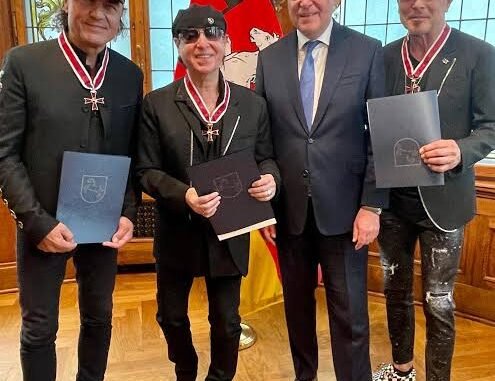
In the year 2000, Klaus Meine, the unmistakable voice of the Scorpions, was awarded the City of Hanover Plaque, a civic honor bestowed upon those who have left an indelible mark on the cultural fabric of the German city. For Meine, this wasn’t just an award—it was an emotional homecoming, a moment of reflection on a journey that began in modest rehearsal rooms and ended on stages that reached the world.
“To be recognized by your own city,” Meine said, “where your story began, where your dreams were first whispered into the night—that means more than platinum records or chart positions. It touches something deeper. This is where my soul lives.”
Meine was born and raised in Hanover, a city not often associated with international rock stardom. But in the late 1960s, alongside guitarist Rudolf Schenker and a rotating cast of musicians who would evolve into the Scorpions, Klaus helped shape a sound that would transcend national borders. With songs like “Still Loving You” and “Wind of Change,” the band brought German rock to global ears—but their identity, their DNA, always traced back to Hanover.
“It wasn’t just a backdrop,” Meine said of the city. “It was a foundation. The streets, the people, the raw energy—they were part of who we became. We carried that with us into every lyric, every chorus.”
The City of Hanover Plaque is given rarely and with great care. It honors not just public achievement, but personal impact—how an individual reflects the city’s spirit back to the world. Klaus Meine, through decades of musical devotion, had done just that. But when asked what the award meant to him, his answer was characteristically humble.
“It reminded me that success doesn’t live in arenas or award shows,” he said. “It lives in the memory of your first song, in the hands that clapped for you when no one knew your name, in the city that never stopped believing in your voice.”
More than two decades later, the plaque remains in his possession—not tucked away in a trophy case, but prominently displayed in his home. “It grounds me,” he said quietly. “It reminds me who I was, who I still am. A son of Hanover. A boy with a guitar. A voice that found its echo here.”
For Klaus Meine, the honor was not an endpoint, but a full circle. A whispered thank-you between a city and one of its most devoted sons.
Leave a Reply